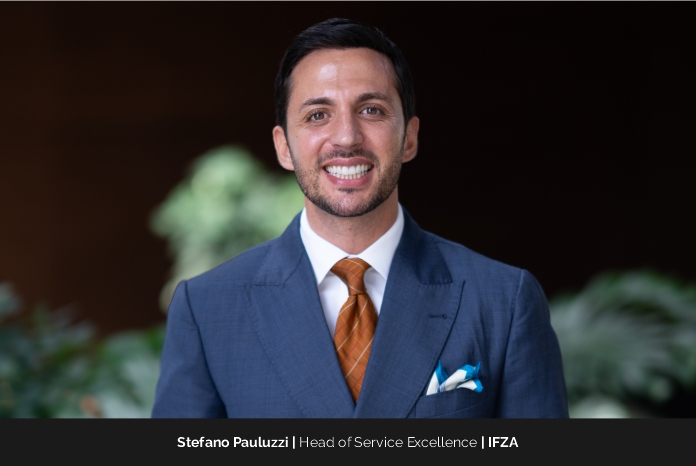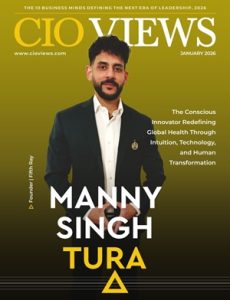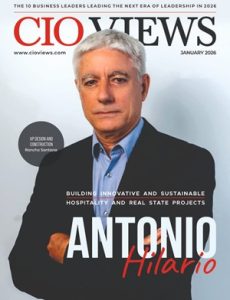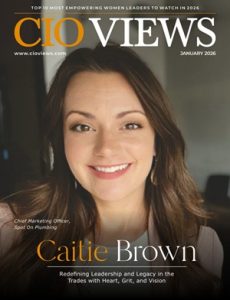For some leaders, success is measured in titles, profits, or milestones. For Stefano Pauluzzi, it has always been about one thing: customer satisfaction. From luxury hotels in Shanghai to pioneering service frameworks in Dubai, his career has been shaped by the conviction that excellence is not an abstract pursuit but something that clients should feel in every interaction. “Customer satisfaction is the true measure of success,” he explains, a belief that has guided him through diverse industries and leadership roles. Today, he continues to refine that principle by blending hospitality expertise, supply chain discipline, and advanced technology into a model of service excellence that is both structured and human.
Defining Instances That Created a Career
Every leader has a journey, but few are marked by as many transformative chapters as Stefano’s. His early career in hospitality instilled the fundamentals of service and leadership, while his tenure at InterContinental Shanghai NECC taught him how to deliver under relentless pressure. “Those years gave me the foundations of empathy, resilience, and consistency,” he says.
The pandemic was a catalyst. What appeared as a disruption opened up a window of reinvention. Assisting his family’s shipping line while earning a Master’s in Supply Chain Management enabled him to diversify his knowledge beyond hospitality. “It taught me that adaptability is leadership,” he maintains, explaining how Lean Six Sigma and root cause analysis became paramount in his toolkit.
Later, at Kerzner International, Stefano led Quality at the group level, while being part of the Operational Team, which spearheaded the pre-opening of six signature properties, like Atlantis The Royal and One&Only One Za’abeel. Here, One&Only Kéa Island left a particular impression. “We hardly had time to impose standards and inculcate teams in a seasonal setup. Everyone felt consistency was not feasible under such conditions, yet by applying Quality Standards on the floor, the excellence of service came as a surprise even to skeptics,” he recollects. Such instances reinforced in him that excellence is not about resources, it’s about structure, clarity, and discipline.
“Excellence is never an accident: it is built when you solve root causes with discipline and protect the client’s trust.”
Injecting Excellence into One’s Organization Culture
Today at IFZA, Stefano puts this vast knowledge to use as Head of Service Excellence. The vision is to make excellence a way of being rather than a task to achieve. “When people find meaning in what they do, excellence follows naturally,” he explains. Rather than treating quality as a reactive measure, Stefano implements root cause analysis, Lean Six Sigma methods, and AI-driven solutions within each process. In this way, excellence is preventive, management is regular, and quantifiable.
The core tenet of this philosophy is the pursuit of excellence. When processes are effortless, service is not only efficient, it becomes a reflection of true commitment to success and meaningful experiences.
Issues That Were Turning Points
The moments that shape a leader are often born from challenges. For Stefano, the pandemic became a defining test of adaptability and resilience, while the fast-paced environment of seasonal hospitality taught him to create structure where none seemed possible. Both experiences deepened his belief in discipline. “Excellence is not about the resources you have, but about the clarity and structure you bring,” he emphasizes.
These lessons now dictate how he maintains consistency across functions and customer touchpoints. Consistency, to him, is about visibility. “Consistency is derived out of visibility and intelligence,” he asserts. Through AI solutions and Lean Six Sigma methodologies, his team is able to monitor compliance, identify risks, and suggest improvement opportunities. In his estimation, standards must never be abstract. They need to be seen, quantified, and experienced daily.
“Service excellence means creating an experience so seamless that the client feels everything was designed just for them.
Creating a Culture of Responsibility
More than systems and processes, Stefano understands that sustainable excellence is about people. His leadership mantra in a nutshell: listen, analyze, act. “Listening captures the voice of the client. Analyzing with root cause tools makes sure that we solve the correct issues. Acting by enabling teams makes accountability feel second nature in culture,” he clarifies. By putting improvement as a team responsibility instead of a directive, he gets teams to accept continuous improvement instead of fighting it.
Recognition is key in this regard. Being celebrated in small steps of advancement helps reinforce accountability and pride of ownership. In his world, excellence is about a culture in which advancement is not enforced; it’s celebrated.
Keeping Ahead of Changing Expectations
One of the most rapidly evolving marketplaces in the world, the Middle East sees client expectations fluctuating at a whirlwind pace. Stefano stays one step ahead by blending real-time data with human judgment. “Data shows trends, people show feelings,” he believes.
AI-based intelligence gives velocity to spot new needs, while in-person discussions with clients and partners guarantee that empathy is never sacrificed in favor of efficiency. Analytics and empathy in tandem mean expectations are anticipated, not responded to.
“The future of service is not reactive; it is predictive, preventive, and profoundly human.”
Role of Technology in Excellence
Technology, in Stefano’s opinion, is not a means, it is a catalyst. AI solutions are being introduced in service platforms to anticipate risks, streamline processes, and tailor experiences. But, in his argument, technology alone is not enough. Technology must be channeled by structure. “AI gives us speed, Six Sigma gives us structure, and both allow our people to shine in empathy and creativity,” he illustrates.
Customization and efficiency are not mutually exclusive, in his opinion, but are instead complements. By eliminating inefficiency with Lean Six Sigma and taking mundane work away that AI makes automated, his teams spend more time crafting customization experiences. “That’s how transactions turn into relationships,” he argues.
Achievements that Inspire Growth
Among recent milestones, Stefano highlights the infusion of AI into the service excellence model as a natural evolution of Lean Six Sigma in the digital age. By combining predictive power with root cause discipline, this approach has led to faster processes, sharper insights, and enhanced quality of service.
“To me, this is about proving innovation safeguarded client interests and fortified relationships,” Stefano says.
“My legacy is simple: a culture where excellence is not an act, but a habit.”
A Tradition of Consistency and Compassion
When asked what advice he would give to junior professionals, Stefano is quick to highlight the importance of discipline. “Learn root cause thinking as a discipline. Don’t take superficial solutions. Improve your knowledge of Lean Six Sigma, consider AI as a friend, and always keep in mind the client,” he advises. Leadership, in his focus, is more about impact, rather than title. “Leadership is solving significant issues,” he asserts.
In the future, Stefano envisions a culture of excellence instilled, not imposed. “My legacy must be a culture of customer satisfaction, of Lean Six Sigma discipline, of AI solution, hand in hand,” argues Stefano. For him, meaningful impact means building systems in which teams anticipate issues rather than responding to them and in which customers are treated with dignity every step of the way.
Conclusion
From luxury hotels to international supply chains to now one of the world’s premier free zones, Stefano Pauluzzi’s life is proof of adaptability, organization, and determination. His one-word philosophy: excellence results when empathy, organization, and innovation converge. By bringing together structured improvement practices with digital innovation, he is helping raise the bar for delivering service that is both efficient and deeply human. In a world in which expectations grow daily, it is a reminder that a leader’s real legacy is not gauged in terms of title or accomplishment, but in repeated satisfaction of customers.





